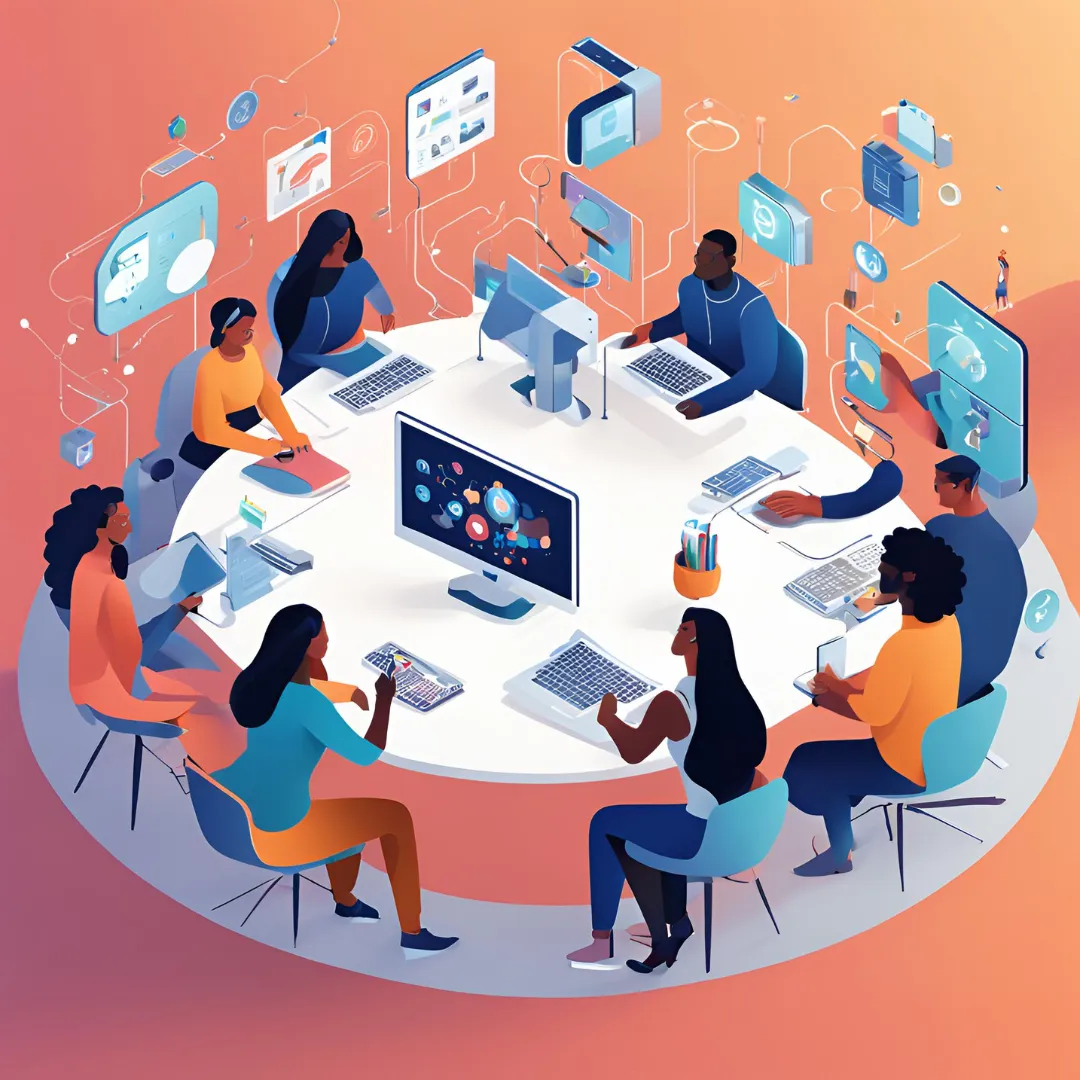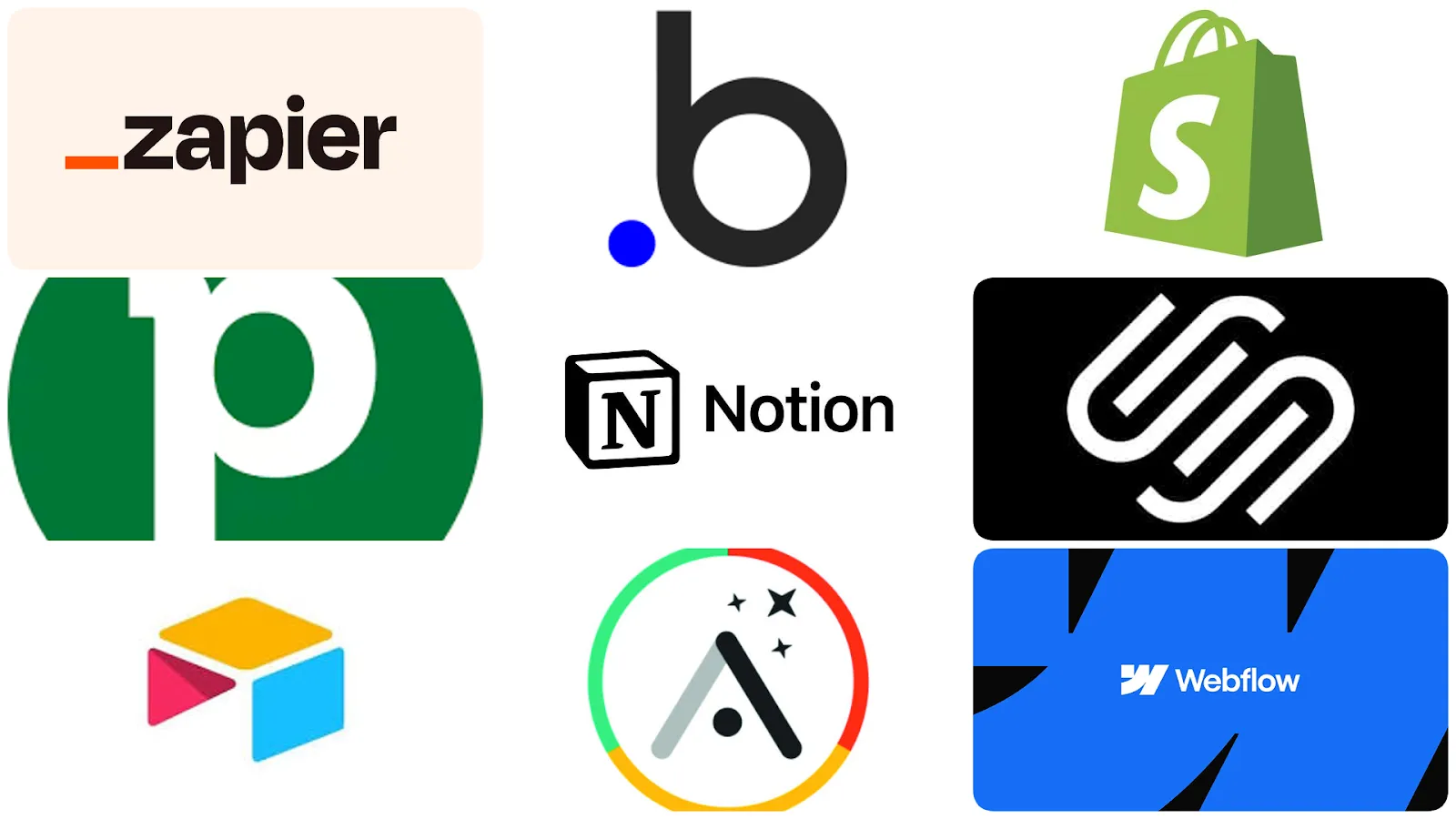What Jobs Can You Get with No-Code Skills?
Explore the range of jobs available to non-tech professionals with no-code skills, from project management to automation specialist. Learn how no-code opens career doors.
Table of contents

Explore the range of jobs available to non-tech professionals with no-code skills, from project management to automation specialist. Learn how no-code opens career doors.
No-code skills are transforming the job market, allowing non-technical professionals to break into tech without needing to learn complex programming languages. Whether you're an office assistant, gig worker, or even a mid-level manager, no-code tools are reshaping how digital products and services are built.

These platforms empower you to create apps, automate workflows, and manage projects—all without writing a single line of code. As businesses continue to embrace digital solutions, the demand for professionals with no-code skills is skyrocketing.
If you're looking for a way to future-proof your career, no-code offers a fast, accessible pathway to new opportunities. Ready to see what doors no-code can open for you?
Let’s dive into the jobs you can land by learning these powerful tools.

No-code platforms have made tech skills more accessible than ever. By offering visual interfaces and prebuilt components, they empower non-technical professionals to create digital solutions without the need for deep coding knowledge.
No-code platforms have revolutionized the way non-technical professionals can enter the tech industry. Instead of relying on developers, you can now build apps, websites, and workflows using visual tools that require little to no coding knowledge.
This shift has allowed individuals from various industries to create digital products without needing a computer science degree.
As Jamie Fernandes, Chief Product Officer at Axonify, notes,
“No-code platforms democratize application development, reducing the need for a plethora of skilled programmers. They empower line-of-business managers with domain expertise to actively participate in software development tailored to their specific needs.”
By removing these barriers, no-code tools open new career opportunities for those eager to transition into the digital world. Leveraging professional organizations can further expand your network, helping you connect with key players in the tech industry.
With businesses constantly seeking ways to stay competitive, no-code skills are becoming a must-have. The ability to build digital solutions without coding expertise makes professionals more agile and adaptable, which is why no-code talent is in high demand across industries.
Businesses today need to innovate quickly, and no-code platforms provide a solution. Instead of waiting weeks or months for developers to build custom applications, companies can now use no-code tools to create apps, automate workflows, and solve business challenges in days.
No-code platforms allow non-technical professionals to take control of software development, reducing costs and speeding up time-to-market.
As Ahmed Qayyum, Webflow Global Leader, puts it,
“No-code platforms make it possible for non-technical users to create and manage custom applications and websites, helping businesses become more agile and responsive to changing needs.”
This ability to pivot quickly is why businesses, from startups to large enterprises, are increasingly adopting no-code solutions.
The shift toward a digital-first economy is another key driver behind the growing demand for no-code skills. As more businesses move their operations online, the need for workers who can build and manage digital products is skyrocketing.
No-code platforms like Webflow, Zapier, and Airtable make it easier for professionals without coding backgrounds to step into these roles, creating opportunities in areas such as app development, process automation, and digital marketing.
As Qayyum notes, no-code platforms not only reduce development costs but also extend functionality through integrations with external data sources and APIs, making them a flexible solution for businesses looking to stay competitive.
In this digital-first world, professionals equipped with no-code skills are becoming indispensable, businesses seek agile professionals who can create digital solutions without coding. By acquiring no-code skills, you can adapt your competencies to limited job markets, where tech roles are abundant.

No-code app developers use platforms like Bubble and Adalo to build web and mobile apps without writing traditional code. This role is ideal for non-technical professionals looking to enter tech.
As a no-code app developer, you create fully functional applications without needing to learn complex programming languages. Platforms like Bubble allow you to design and build web apps, while Adalo is great for mobile app development.
These tools provide drag-and-drop interfaces, pre-built components, and easy integrations, enabling you to create powerful digital products without writing a single line of code.
Startups are increasingly turning to no-code platforms to build MVPs (Minimum Viable Products) quickly and cost-effectively. For example, many small businesses use Adalo to launch customer-facing mobile apps, streamlining their operations and enhancing customer experiences without hiring expensive development teams.
Bubble has also become a go-to for entrepreneurs wanting to test ideas without huge upfront investments.
The demand for no-code app developers is booming, especially in startups and small to medium-sized businesses. According to Glassdoor, no-code developers in the UK can earn an average base salary of £126,221 per year, with total compensation reaching up to £135,433 when bonuses and additional pay are factored in.
As more companies adopt no-code tools, the job outlook for developers with these skills continues to rise, making this a lucrative career option. Establishing yourself as an expert in no-code app development can attract consulting gigs and job offers in various industries.
Automation specialists use no-code tools to automate repetitive business tasks, helping companies improve efficiency without traditional development. Tools like Zapier and Integromat (now Make.com) are key in these roles.
As an automation specialist, you simplify and streamline business operations by creating automated workflows. Using no-code tools like Zapier or Integromat, you can integrate apps and systems to perform repetitive tasks—such as sending automated emails or updating spreadsheets—without the need for a developer.
This automation boosts productivity, allowing businesses to focus on strategic work instead of manual processes.
Automation specialists help businesses automate tasks across departments like marketing, HR, and customer service. For example, in marketing, you can use automation to automatically nurture leads or send follow-up emails.
In HR, you can set up workflows to manage employee onboarding. Customer service can benefit from automations that route tickets or send customer feedback forms. These no-code solutions optimize processes without requiring custom-built software.
To succeed as an automation specialist, you need strong problem-solving skills and a deep understanding of business processes. The key tools in this role include Zapier, Integromat, and Airtable.
You also need to grasp process design and logic, as these help you map out how tasks flow and trigger automation steps effectively. Being detail-oriented is essential to ensuring every workflow runs smoothly.
The market for no-code automation experts is rapidly expanding. As businesses increasingly rely on automation to reduce manual tasks and improve efficiency, the demand for professionals who can build and optimize these systems continues to grow.
According to a recent job posting in Upwork, automation specialists can earn anywhere from $15 to $80 per hour depending on experience and project complexity. This demand makes automation an attractive, high-growth career path for those with no-code skills.
Digital marketers with no-code skills can automate campaigns, build landing pages, and manage customer experiences without relying on developers, making them more efficient and adaptable in today’s fast-paced environment.
No-code tools are becoming essential for digital marketers who want to streamline their workflows and optimize campaigns. With platforms like Webflow, you can easily create landing pages, while Zapier allows you to automate repetitive tasks like sending emails or posting on social media.
These tools help marketers handle complex campaigns without needing developer support, giving them full control over customer journeys.
Digital marketers can now rely on no-code platforms to power their campaigns. For example, Webflow helps you build custom landing pages, Unbounce allows for easy A/B testing and lead generation, and Zapier automates tasks like email marketing and social media scheduling. These tools enable marketers to deliver results faster and more efficiently.
With no-code skills, digital marketers can move faster and optimize their processes without the need for developers, making them more self-sufficient. This ability to create and adjust campaigns in real-time gives them a competitive edge in the job market.
As entry-level digital marketing roles offer base salaries between $39,281 and $60,359, having no-code expertise can position you as an invaluable asset, increasing your value to employers by boosting efficiency and innovation.
No-code tools are becoming indispensable for product managers, enabling them to prototype, test, and iterate on product ideas quickly. This skill helps bridge the gap between business needs and technical solutions.
Product managers in tech can now use no-code tools like Figma, Bubble, and Glide to prototype and test new features without waiting for developers.
These platforms allow you to create interactive prototypes, test user experiences, and validate ideas before handing over the project to the development team. This rapid iteration process helps bring products to market faster, reducing time and costs.
No-code platforms make it easier for product managers to collaborate with cross-functional teams, including design, development, and marketing.
By using tools like Bubble or Glide, you can quickly build prototypes that designers can refine, developers can enhance, and marketing teams can understand—boosting team alignment and project success. This flexibility improves communication across teams and accelerates the product development cycle.
The need for product managers who can seamlessly integrate business objectives with technical solutions is growing, especially in fast-paced startup environments. By mastering no-code tools, you can become more agile, managing the product lifecycle from ideation to launch with greater efficiency.
Entry-level product managers, such as Associate Product Managers (APMs), earn around $85,000 annually, while full-fledged product managers command salaries averaging $120,000 in the U.S.
Having no-code expertise positions you as a versatile asset in any product management role, making you more competitive in this dynamic field.
Freelancers and entrepreneurs are harnessing the power of no-code tools to build digital solutions like websites, e-commerce platforms, and apps—all without hiring developers. Thriving in the gig economy can be easier when you master no-code tools to deliver high-quality digital solutions to clients.
Thanks to no-code platforms, freelancers and entrepreneurs can now build robust digital products, such as websites, e-commerce stores, and mobile apps, without needing to hire a team of developers.
These tools offer drag-and-drop functionality, pre-built templates, and integrations that make building custom solutions more accessible, enabling you to launch faster and reduce startup costs.
Entrepreneurs can use platforms like Shopify, Webflow, Wix, and Squarespace to create fully functional websites and online stores, while Bubble and Adalo allow you to develop apps with minimal effort.
These platforms empower freelancers to deliver high-quality services to clients, whether they're designing a website or building an app, without the complexity of traditional development.
There are countless success stories of freelancers and entrepreneurs making six figures using no-code tools. Take Jason Chin, who earned over $500,000 from selling Notion templates, or JJ Englert, who built a successful no-code development career using Bubble.io.
Entrepreneurs used no-code platforms, turning their ideas into thriving businesses without the massive costs of hiring developers. With no-code, you can start a profitable business or freelance career while keeping expenses low and time-to-market fast.

No-code platforms are a game-changer for tech startups, enabling them to prototype, launch, and scale their products quickly, without the high costs and long timelines associated with traditional development. Startups rely on no-code to validate ideas fast and iterate based on real-world feedback.
Startups thrive on agility, and no-code platforms like Bubble and Webflow allow them to bring ideas to life rapidly.
Instead of spending months building an MVP (Minimum Viable Product) from scratch, founders can now use these tools to design, build, and deploy functional prototypes within weeks.
This enables them to test concepts, gather user feedback, and make iterative improvements without a hefty investment in developers. For early-stage startups with limited budgets, this speed and cost-efficiency are critical to staying competitive.
Comet is a perfect example of a no-code success story. Launched in 2016 by three roommates, Comet started as a freelancing marketplace built entirely on Bubble.
Despite the founders' non-technical backgrounds, they were able to quickly create a fully operational platform that helped freelancers deliver over 300 projects and achieve an impressive monthly recurring revenue (MRR) of $800,000.
By leveraging no-code tools, Comet scaled rapidly, attracting high-profile clients like Renault and LVMH and securing €14 million in venture capital. This startup’s success underscores how no-code tools enable non-technical founders to create viable, scalable businesses.
Another inspiring case is Scribly.io, a content marketing service launched by British freelancer Dani Bell. Scribly was built using no-code tools like Webflow for its website,
Airtable for managing content, and Zapier for automating workflows. Within just 6-8 weeks, Dani had a fully functional platform ready to serve clients. Scribly hit $30K in MRR within its first year, all without writing a single line of code.
This success story highlights how no-code empowers entrepreneurs to turn ideas into profitable businesses without needing technical expertise or a large development budget.
No-code platforms are revolutionizing e-commerce by allowing entrepreneurs to build and scale online stores without the need for developers. These tools simplify the entire process, from store design to inventory management and customer experience, enabling businesses to get up and running quickly.
Entrepreneurs can now create professional and fully functional online stores using no-code platforms like Shopify and Squarespace. These platforms provide everything needed to manage inventory, process payments, and customize customer experiences, all through easy-to-use interfaces.
This drastically reduces the barrier to entry for e-commerce businesses, enabling them to launch in a matter of days rather than months. Plus, these platforms offer scalability, allowing businesses to grow seamlessly as demand increases.
For entrepreneurs seeking more customization, Webflow is an excellent choice for building bespoke storefronts. Tools like Zapier also play a crucial role in automating essential tasks such as order fulfillment, customer emails, and inventory updates, helping store owners save time and focus on growth.
These no-code solutions streamline operations, making it easier for entrepreneurs to run and scale successful e-commerce businesses.
Take Floof, a cotton candy company founded by Hannah Perry, as a prime example of e-commerce success using no-code. Floof began as a small operation in Hannah’s kitchen, making cotton candy tubs, but the business gained massive traction after a viral TikTok video.
Hannah originally used Wix to build her website but eventually switched to Shopify to handle the surge in demand. With Shopify’s built-in tools, Floof could easily manage its orders and deliveries, even allowing customers to select specific delivery dates.
This switch helped Floof grow from a kitchen-based operation to a business with a commercial kitchen and a storefront. By using Shopify’s no-code platform, Floof expanded quickly without needing to invest in a costly web development team.
No-code platforms are reshaping the education and online learning landscape, making it easier for educators and course creators to build, manage, and sell online courses.
Educators are turning to no-code platforms like Teachable, Thinkific, and Podia to create and sell online courses with minimal effort. These platforms provide all the tools needed to design course materials, manage student enrollment, process payments, and even offer features like affiliate tracking for promotional purposes.
This allows instructors to focus on content creation and student engagement without worrying about the technical aspects of building a learning platform.
Kari Sayers, an online course creator, shared her success with Teachable, a popular no-code platform for educators. Kari built her online school using Teachable’s easy-to-use interface, which helped her grow her student base by offering both free and paid courses.
She praised Teachable for its built-in affiliate tracking and bulk discount capabilities, which helped her promote her courses more effectively. Although Teachable is not a marketplace like Udemy, Kari emphasized how it allowed her to build relationships with her audience directly and control her marketing strategy.
This success story illustrates how educators can leverage no-code tools to build profitable online learning businesses and engage with their audiences in meaningful ways.
By using no-code platforms, entrepreneurs, educators, and businesses can quickly bring their ideas to market, minimize costs, and scale efficiently across multiple industries.

No-code platforms provide a quicker way to reskill, offering a much shorter learning curve compared to traditional coding. This allows professionals to swiftly transition into tech roles without years of study.
Learning to code can take years, but no-code tools make it possible to develop digital products in just a few weeks. With drag-and-drop interfaces and pre-built components, platforms like Bubble, Adalo, and Webflow allow you to build apps and websites without needing to dive into complex programming languages.
Reskilling with no-code offers a fast transition into tech roles. Developing a growth mindset is key to staying motivated and agile during your career transition.
This reduced learning curve means that whether you're a marketing professional or an office assistant, you can quickly acquire the skills necessary to switch to a tech career and begin contributing immediately.
Take Beatriz, for example, a student of NoCode Institute’s foundation course. Initially a marketing consultant, she realized the need to offer digital products to her clients but didn’t want to learn to code.
After discovering no-code, she was able to build websites and digital solutions without the complexity of traditional programming, allowing her to expand her services and grow her business.
One of the biggest advantages of no-code tools is the flexibility they offer. You can learn no-code skills while maintaining your current job, making the transition to a new career less risky.
Whether you’re working full-time or part-time, platforms like NoCode Institute’s Foundations program are designed to fit into your schedule, allowing you to upskill without needing to take time off from work.
Beatriz’s journey highlights this perfectly. While working for a company consultancy, building a web platform to help businesses manage projects and insert data, she managed to learn no-code skills in her spare time.
This allowed her to offer additional services like web design, expand her business, and meet her clients' digital needs—all while keeping her main job intact. For professionals like Beatriz, no-code offers a way to expand career opportunities without disrupting current responsibilities.

Tobi Gbemisola, a digital marketer from Lagos, Nigeria, made a life-changing career transition to full-time Bubble development. After years of working in digital marketing, Tobi felt limited in his role and began to explore new career paths. In 2020, he discovered Bubble through a video ad and was intrigued by the promise of building apps without coding.
His skepticism quickly turned to fascination as he dove into no-code development, building his first MVP in just two months.
Initially balancing his marketing job, Tobi eventually enrolled in a Bubble bootcamp and took the leap into full-time development. Since then, he has built apps for clients across the world, launched side projects like JobHunch, and even works as a Bubble coach at SkillHat.
No-code opened doors for Tobi that traditional coding couldn’t, allowing him to build and launch digital products quickly and take control of his career trajectory.
Tobi's story is an inspiring example of how no-code platforms can empower professionals to switch careers, unlock new opportunities, and create digital solutions with minimal barriers.
Katie Fleet, an experienced teacher and education advisor, noticed a recurring challenge in her career: how to measure student progress and teaching quality effectively. In her roles across the private, public, and government sectors, the reliance on periodic data snapshots didn’t reflect the real, ongoing progress of students.
This inspired Katie to create Your Edu Journey, a no-code app designed to provide real-time data on student progress and quality teaching, addressing the gaps she saw in traditional education metrics.
Using no-code platforms, Katie was able to build an app that helps teachers capture relevant, continuous learning data without overwhelming them with administrative tasks. Her app empowers educators to provide their supervisors and government decision-makers with meaningful insights, while promoting better teaching practices.
Thanks to no-code, Katie was able to turn her vision into a digital product that is transforming how educators track student outcomes and support classroom success—without needing to hire developers or write code.
Before diving into no-code, it's important to align your learning path with your career goals. Whether you're interested in marketing, entrepreneurship, or product management, the right no-code tools can accelerate your progress.
No-code platforms are designed to be versatile, but they serve different purposes depending on the tool.
Entrepreneurs who want to launch a startup can use Bubble to build functional web apps without hiring developers, while marketers may find Unbounce and Webflow more useful for designing landing pages and optimizing campaigns. Those in product management might look at Figma for rapid prototyping.
By clearly defining your goals—whether you want to work in marketing, app development, or digital product management—you can better choose the platform that will set you up for success.
As this blog by Quixy explains:
"No-code tools have many useful and unique features that can propel your business to a new level. The hardest question is how to choose the right platform and implement it effectively."
Choosing the right tool for your industry will allow you to maximize your efficiency, reduce development costs, and take advantage of faster time-to-market strategies.
Conducting thorough industry research can help you find job opportunities that match your no-code skills and professional interests.
The beauty of no-code is that you don’t need a large investment to get started. Plenty of free resources exist to help you build skills from scratch. Whether you prefer online tutorials, forums, or structured courses, there are countless ways to dive into no-code without breaking the bank.
Here are some great free resources to help you begin your no-code journey:
These resources offer structured paths for learning no-code and also introduce you to larger communities where you can ask questions, collaborate on projects, and get feedback.
Creating a portfolio of no-code projects is essential for showcasing your skills to potential employers or clients. Even if you're just starting, simple projects like automating tasks or building landing pages can demonstrate your abilities and practical knowledge.
A strong portfolio is a vital tool for anyone looking to demonstrate their no-code abilities. It provides tangible proof of your practical experience and helps you stand out in a competitive job market. Here’s how to effectively showcase your skills:
A well-constructed portfolio gives potential employers and clients a clear picture of your capabilities, making it a crucial asset when applying for jobs or securing freelance work in the no-code industry.
No-code skills are transforming careers across industries, opening doors to a variety of roles. From product management and automation specialists to freelance app developers and digital marketing managers, professionals equipped with no-code expertise have a distinct advantage in today’s competitive job market.
No-code allows individuals to build digital products, automate workflows, and launch businesses without the need for traditional coding knowledge, making it an accessible skill for both career changers and entrepreneurs.
The demand for no-code skills is growing rapidly across industries such as tech startups, e-commerce, and education. Whether you’re interested in developing apps, optimizing marketing campaigns, or building e-commerce platforms, no-code tools provide the flexibility and efficiency needed to excel in a digital-first economy.
This broad applicability gives you the ability to explore diverse career paths and create solutions that drive value in any industry.
Ready to transform your career? Enroll in NoCode Institute’s programs and learn to build apps, automate tasks, and launch digital solutions—all without coding. Start your journey today!
Looking to re-invent yourself and turn your talent into a career? Stay up to date with the latest.